The Hunger Games: Catching Fire suffers from a problem comic to the second story in planned trilogies. It lacks its own clear arc or structure, instead serving as a little more (or perhaps a little less) than half a film. There’s no conclusion or resolution here, just a lot dangling plot threads and insinuations – the suggestion of a larger and grander conflict looming on the horizon that might offer some measure of closure.
While it improves on quite a few flaws from the first film, it ultimately feels rather hollow; like an extended trailer for The Hunger Games: Mockingjay.
It’s something very common to films like this, particularly in the second instalments of series that weren’t necessarily planned as long-runners in the first place. The first part stands alone because it might not be successful enough to guarantee a sequel, and so it has its own character arcs and structure, its own ending. The prospect of a wider universe is heavily suggested, but that first instalment remains its own story. Then, due to massive success, the story earns not only a sequel, but a franchise.
Suddenly the next story doesn’t have to stand alone. Suddenly, there are several movies to fill, and the suggestion is to weave those stories tighter together. There are quite a few examples of this, both in book publishing and in cinema. George Lucas’ Star Wars functions perfectly well as its own narrative, because there’s a sense Lucas feared it might be the only story he would get to tell. The two sequels were a lot more confidently connected to one another. The Matrix stands perfectly fine on its own two feet, but the two sequels feel like halves of one over-long film.
The best middle instalments in movie trilogies – films like The Empire Strikes Back or even The Two Towers – work because they turn this structural element to their advantage. The prospect of “an ending that isn’t really an ending” allows the films to play with story conventions and get away with twists and revelations that wouldn’t work in any other context. The bleak and contemplative ending of The Empire Strikes Back is only made possible by the reality that the happy ending has only been postponed a film, rather than completely abandoned.
In contrast, The Hunger Games: Catching Fire is somewhat passive about its place in the grand scheme of things. Even the movie’s eventual cliffhanger is mostly expositional – abstract problems discussed by a bunch of characters in a new concept. There’s no big visual that closes that scene, no real sense that Catching Fire is its own story that just happens to end off where Mockingjay might pick up. Instead, the hook is rather bland.
The film might have been much more effective had it gone on for a scene longer or two scenes shorter – showing us that this is the end of one chapter and the beginning of something grander, instead of closing on an dialogue scene that exists purely to up the stakes. “Luke is defeated by his father, Han is captured and the rebels limp off into the night” is an inversion of the sort of happy ending we expect from a space opera. “The battle of Helm’s Deep” is a story. “Katniss hears some exposition” feels like the description of a scene from a middle of a film rather than the ending.
Still, while Catching Fire struggles with the structural elements of the second instalment of a trilogy, it does improve on its predecessor in a number of ways. The most disappointing thing about The Hunger Games was the way that the film lacked teeth. It was a film about a society that televises children murdering children. It should be horrific and uncomfortable and challenging. Instead, The Hunger Games was more concerned with being family-friendly and uncontroversial.
Catching Fire isn’t really any bolder than its predecessor. The violence has a bit more edge to it this time, but the film still struggles between condemning the games and thinking that actually, you know, this is kind of exciting. However, Catching Fire works a lot better for two reasons. The most obvious is the fact that it is less focused on the big competition than the first film, so the fact that it’s unwilling to commit to the horror of the sport is less of an issue.
Instead, the film is more preoccupied with celebrity and gossip culture – the maintenance of public image and the distraction from real issues with cheap banter and fancy clothes. While Catching Fire doesn’t really have anything particularly provocative or compelling to say about that culture, it does a solid job presenting a commentary the vacuous nature of celebrity culture, of the role and responsibility of being famous, and the gap that exist between the image projected and the reality.
Winning the games, Katniss finds her every move perfectly choreographed, her every action recorded and broadcast. She’s forced to play up the façade, finding herself living the lie. Katniss discovers that celebrity is less about what you’ve done than how you are perceived, the myth you craft around yourself – and the myth that others try to craft for you. It helps that Catching Fire finds time to give Katniss a legitimate foil, in the form of smooth politico Donald Sutherland, playing despot and circus master.
Celebrity is an interesting topic, and it’s something that Catching Fire can play with without the fear of hurting is marketability. The Hunger Games offered a surprisingly sanitised version of kid-on-kid violence for fear that a strict rating might damage the movie’s bottom line, but Catching Fire can play with celebrity without provoking the wrath of the film censor. And Catching Fire comes closest to working when it’s exploring the way that Katniss seems to be trying to wrest control of her own narrative from those around her.
Even the game scenes work a lot better here. Part of this is because Catching Fire is a bit more interested in the psychology of this sort of “bread and circuses” entertainment. The participants seem to have agendas, and there’s a palpable sense of personality and moral uncertainty that never really existed in The Hunger Games. While the movie still conveniently sorts contestants into “good“ and “bad” subcategories, there’s a much more interesting group dynamic at play here.
Catching Fire still inherits some of the lesser problems from its predecessor. It does feel a little overly bloated, and the movie could do with a trim – a tighter edit might smooth out some of the problems. Running over two-hours and lacking any real pay-off, Catching Fire can be quite frustrating. The film is also astonishingly on-the-nose at times, with characters neatly summarising the key points to be garnered from earlier conversations.
When Catching Fire evokes one of the more common apocryphal myths about Ancient Rome’s vomitoriums, offering a character a drink to make him throw up – “it makes you sick, so you can eat more” – that character then goes on to explain that this example illustrates just how much food is wasted in the Capital. It’s a little heavy-handed, and it’s far from the only such scene. While Philip Seymour Hoffman’s character undoubtedly has an important part to play in the saga, he spends most of Catching Fire having the same conversation with Donald Sutherland.
To be fair, the cast for Catching Fire is much stronger than its predecessor. Changing the format of the game allows the movie to draw in a broader spectrum of adult performers, and Donald Sutherland is given some nice scenery to chew. In particular, Snow’s early conversation with Katniss is delightfully uncomfortable. Jennifer Lawrence is a superb leading actress, but she’s far stronger than most of the other young adult performers in these movies. There is a reason she has an Oscar, after all. Allowing her to work with actors like Sutherland and Jeffrey Wright is a smart move that pays off dividends.
Despite a few lingering issues, Catching Fire does avoid most of the major flaws of The Hunger Games. However, it comes with more than its own fair share of problems. The most obvious is that Catching Fire feels like half a movie, which is especially frustrating when we know that the next film in the saga is itself going to be divided in half. If Catching Fire is anything to go by, Mocking Jay, Part I may only be a quarter of a film.
Filed under: Non-Review Reviews | Tagged: arts, Catching Fire, film, george lucas, Hunger, Hunger Game, Hunger Games, Hunger Games: Catching Fire, Jennifer Lawrence, Josh Hutcherson, Katniss Everdeen, Mockingjay, Movies, Poverty |















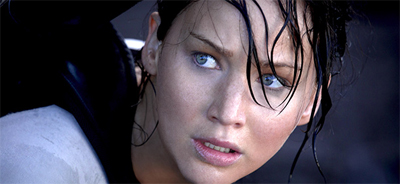
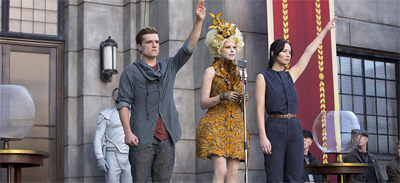
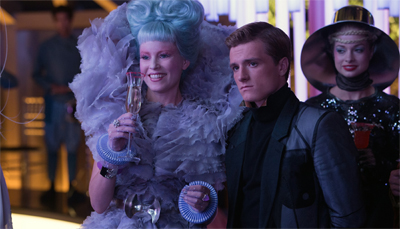
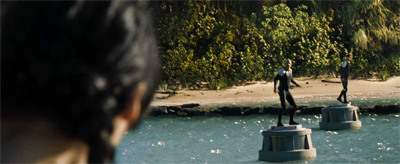
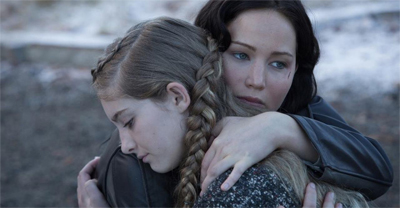
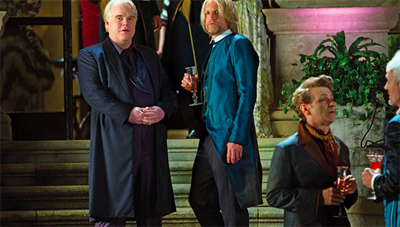
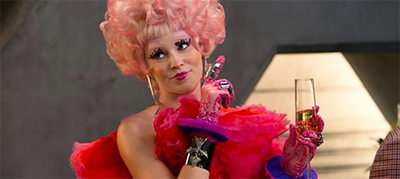






Sounds like you still mostly enjoyed it, but also lament that it doesn’t have resolution. Interesting.
Seeing it tonight. We’ll see if I have a similar reaction. 😉
As always, a well-written, easy to read review. I’m getting the sense that you haven’t read the book – am I right? Collins’ novel ends in similar fashion to the film, which for me makes the abrupt cliffhanger a little easier to appease…
I never thought how Catching Fire was just an in-between between The Hunger Games and Mockingjay, but now that I rethink how the movie was structured it makes sense. Nothing was answered, everything was left to deal with later, in Mockingjay, and the movie did not have true substance like the other. However I did appreciate how well it stayed true to the book, leaving out only a few scenes and adding little else. It kept the story true to the book, which was designed as a cliffhanger by the author. The movie could have been shorter, I found myself thinking how much longer there was, and if what was happening was truly important. The ending had no conclusion and it did bother me, but overall the movie stayed true to the book and was executed well.
Looking forward to seeing it. I always check your reviews first.
The worse film ever! Wasting 3 hours of my life, and my 14$, feel sick, feel that I was brutally cheated! I wanted to get out on 10th minute but I was with my boyfriend. After the movie I felt the I was working like a horse in a feild! So exhausted and depressed! It was smelling with sedness, depression and the suiside!
That’s a bit extreme, no?
Good Review 😀
It was a great film, really liked it a lot. Thought it was a fantastic improvement over the first, and I cannot wait for the next one, especially after that ending 😀
Thanks Tim!
I really disliked the ending. I get the sense it might work in prose, but it needed a much stronger visual punch if that is what they were going to end on. Compare the ending of The Desolation of Smaug, which is also a cliffhanger, but features a suitably striking closing image.
Middle child syndrome 😦
Have you read the book I feel that you haven’t read the book. There will be a part three therefore they had to end that way cause that’s the exact way the book ended. It was a cliffhanger on purpose everything is explained in part three which will be split in two.
Yep, but things that work on the page don’t always work on the screen.